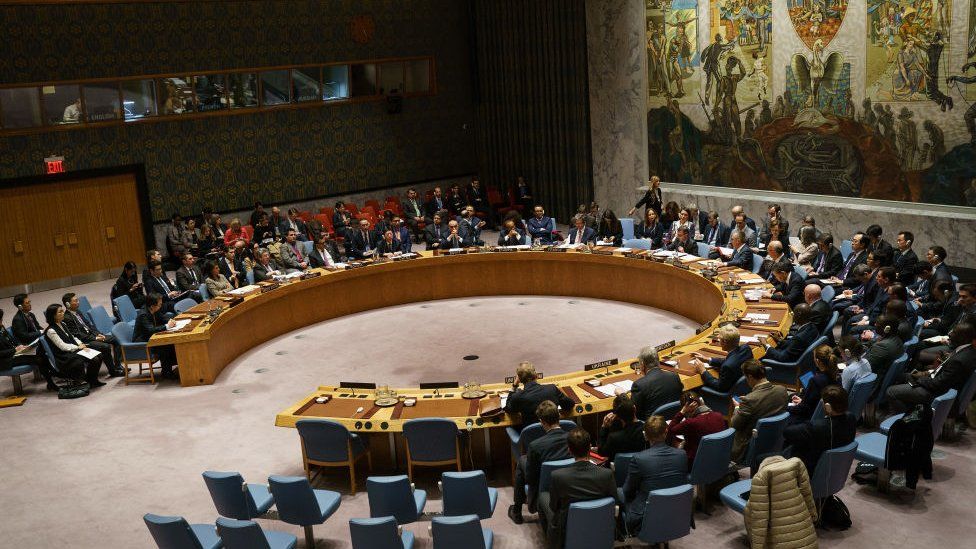N Korea: UN draft report claims Singapore firms illegally sent luxury goods
- Published

A leaked draft of a United Nations report claims two Singapore companies have violated UN sanctions by supplying luxury goods to North Korea.
The final report has been submitted to the UN Security Council, and is likely to be published later this week.
Singapore's government said it was aware of the cases and had begun investigating where there was "credible information" of possible offences.
Both the UN and Singapore ban the sale of luxury goods to North Korea.
Global sanctions against North Korea have tightened considerably over the last two years as Pyongyang has continued to conduct nuclear tests and launch missiles.
Despite the recent development that unprecedented talks between North Korea's leader Kim Jong-un and US President Donald Trump may take place later this year, UN sanctions against North Korea will remain in place.
Analysts say the alleged violations by Singapore companies, if proven, raise questions about how widespread such breaches might be across Asia.
Who's been named in the UN report?
The leaked UN report highlights two Singapore-based firms, among others in Asia.
It alleges the two firms supplied a range of luxury goods to North Korea, including wines and spirits, until as recently as July 2017.
Under UN Sanctions, it has been illegal to sell luxury items to North Korea since 2006. And Singapore's laws have banned the sale of these items to North Korea for several years.
The two Singapore-based firms under investigation are OCN and T Specialist. They are sister companies and share the same director.
Both the companies have denied any wrongdoing.
The UN report also claims between 2011 and 2014 "transactions valued at more than $2m (£1.4m)" - allegedly proceeds from the sale of goods in North Korea - flowed from an account that OCN and T Specialist set up in a North Korean bank, Daedong Credit Bank, to T Specialist's bank accounts in Singapore.
Singapore has banned its financial institutions from providing financial assistance or services for facilitating any trade with North Korea, according to the Ministry of Foreign Affairs.
T Specialist has testified to the UN that the funds did not come from North Korea but a company registered in Hong Kong, and related to sales before 2012.
The two companies are also accused by the UN of having "long-standing, close ties" - including ownership ties - with Ryugyong Commercial Bank, a bank the US put on its sanctions list in 2017.
The Singaporean companies said they have no interests in the bank.
Their lawyer, Edmond Pereira, has confirmed they are under investigation by Singapore authorities, but insisted they did not have any current financial links, interests, or any sort of relationship with entities in North Korea.
Mr Pereira acknowledged that his clients "have done business with North Korean entities... before the UN sanctions came into force".
He added the companies had "reduced their involvement" in North Korea but that "these things take a bit of time".
Lawyers have said part of the problem is these sanctions are expected to be enforced by companies who are often unaware of the changes in the law.
Singapore-North Korea trade
It was only in November last year that Singapore banned trade with North Korea entirely. Before that, some trade was allowed.
The UN report claims some of the transactions in the OCN and T Specialist cases appear to have used the Singapore financial system.
It also said it was the responsibility of member countries to make sure their banks had a more "robust scrutiny" of individuals and companies opening accounts with them.
The BBC contacted the two Singapore banks mentioned in the report. Both banks declined to comment, citing Singapore's banking secrecy laws.
The Monetary Authority of Singapore (MAS) told the BBC it was working closely with the UN on these cases.
"MAS will take stern action against any financial institutions in breach of regulations relating to proliferation financing," MAS said in a statement sent to the BBC.
The authority also said it expected banks to be aware of "the use of multi-jurisdictional front companies, shell companies, joint ventures, and complex or opaque ownership structures".
Difficult for banks to catch
William Newcomb, a former member on the UN Panel of Experts, said it was precisely these financial loopholes North Korea seeks to exploit.
"What they will do is set up a shell company, then establish a company in another location, a bank in a third location, and do business in another location," he explained.
"And now you have multiple jurisdictions involved. So it becomes quite complicated, and it's one of the techniques they use to defeat the sanctions."
Was your T-shirt made in North Korea?
Financial crime researchers say it is difficult for banks to catch this sort of behaviour.
"You would probably never know that the funds were coming from North Korea," said Tim Phillipps, Asia Pacific Leader for Deloitte's Financial Crime Network.
He added the problem could be much bigger across South East Asia.
"If you're named in a report in this environment in Singapore, the MAS are highly likely to demand extensive transaction history examination.
"But if you start to look across the other countries in South East Asia, they generally haven't got the maturity of systems to prevent this."
The UN report highlights how easily entities allegedly doing business with North Korea might potentially find loopholes to use - even in sophisticated financial systems like Singapore's.
- Published9 March 2018
- Published9 March 2018
- Published23 December 2017